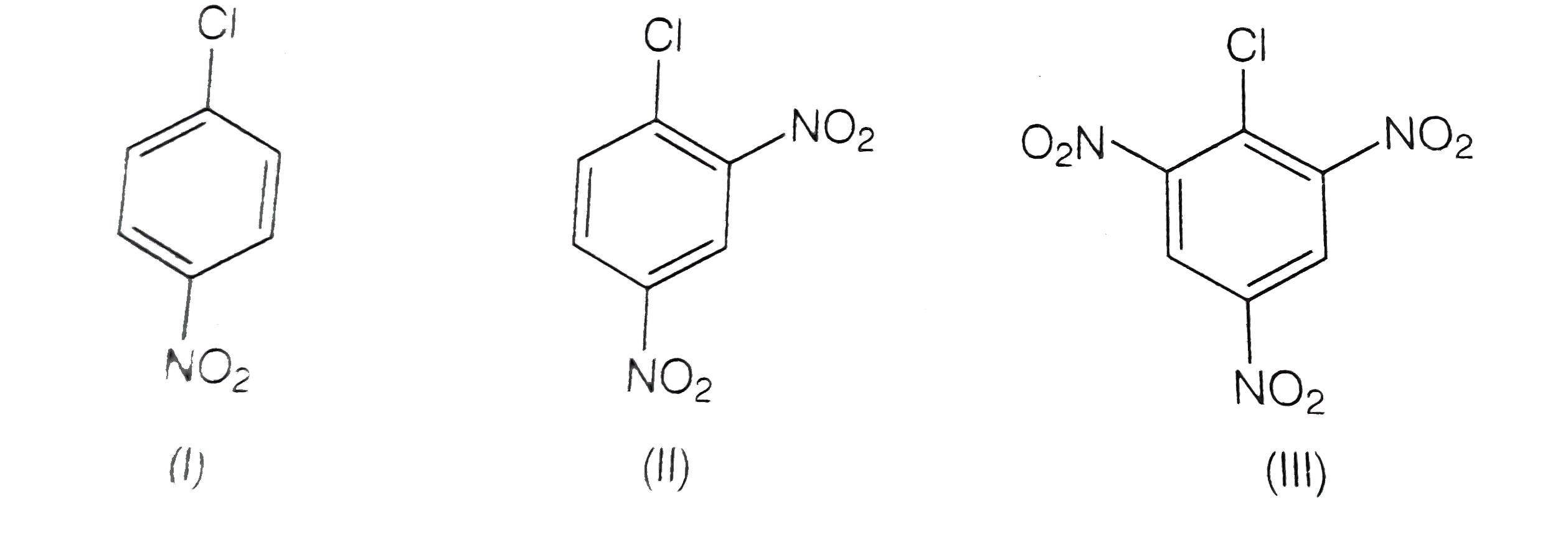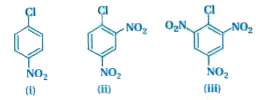Explain why aryl halides are extermely less reactive towards nucleophilic substitution reactions. Solution in Gujrati
Aryl halides are extremely less reactive towards nucleophilic substitution reactions due to the following reasons :
(i) Resonance effect : In haloarenes, the electron pairs on halogen atom are in conjugation with π - electrons of the ring and the following resonating structures are possible.

The C - Cl bond acquires a partial double bond character due to resonance. As a result, the bond cleavage in haloarene is difficult than haloalkane and therefore, they are less reactive towards nucleophilic substitution reaction.
(ii) Difference in hybridisation of carbon atom in C - X bond : In haloalkane, the carbon atom attached to halogen is sp3 hybridised while in case of haloarene, the carbon atom attached to halogen is sp2 - hybridised.

The sp2 hybridised carbon with a greater s - character is more electronegative and can hold the electron pair of C - X bond more tightly than sp3 -hybridised carbon in haloalkane with less s - chararcter. Thus, C - Cl bond length in haloalkane is 177 pm while in haloarene is 169 pm. Since it is difficult to break a shorter bond than a longer bond, therefore, haloarenes are less reactive than haloalkanes towards nucleophilic substitution reaction.
(iii) Instability of phenyl cation : In case of haloarenes, the phenyl cation formed as a result of self - ionisation will not be stabilised by resonance and therefore, SN1 mechanism is ruled out.
(iv) Electronic Repulsions : It is less likely for the electron rich nuclephile to approach electron rich arenes.
Topper's Solved these Questions
- HALOALKANES AND HALOARENESBOOK - KUMAR PRAKASHANCHAPTER - HALOALKANES AND HALOARENESEXERCISE - SECTION - B INTEXT QUESTIONS AND ANSWERS
20 Videos
- HALOALKANES AND HALOARENESBOOK - KUMAR PRAKASHANCHAPTER - HALOALKANES AND HALOARENESEXERCISE - SECTION - C TEXTUAL EXERCISE
87 Videos
- HALOALKANES AND HALOARENESBOOK - KUMAR PRAKASHANCHAPTER - HALOALKANES AND HALOARENESEXERCISE - SECTION - E Multiple Choice Questions
260 Videos
- GENERAL PRINCIPLES AND PROCESSES OF ISOLATION OF ELEMENTSBOOK - KUMAR PRAKASHANCHAPTER - GENERAL PRINCIPLES AND PROCESSES OF ISOLATION OF ELEMENTSEXERCISE - SECTION - E (MCQs ASKED IN GUJET/BOARD EXAMS)
46 Videos
- POLYMERSBOOK - KUMAR PRAKASHANCHAPTER - POLYMERSEXERCISE - SECTION - E (MCQs asked in Board Exams)
51 Videos
Similar Questions
Write the structures of the following compounds :
2-Chloro-3-methylentane
View SolutionName the following halides according to IUPAC system and classify them as alkyl, allyl, benzyl (primary, secondary, tertiary), vinyl or aryl halides :
(CH3)2CHCH(Cl)CH3
View SolutionThe derivatives that are not found in nature are …..
View SolutionDuring electrolysis of aqueous solution of Na2SO4 using graphite electrode .........
View SolutionWhich polymer is used in preparation of capsules ?
View SolutionAryl halides are less reactive towards nucleophilic substitution because
View SolutionAryl halides are extermely less reactive towards nucleophilic substitution. Predictand explain the order of reactivity of the compounds towards nucleophilic substitution.

View SolutionAryl halides are less reactive towards nucleophilic substitution reaction as compared to alkyl halides due to
View SolutionAryl halides are extremely less reactive towards nucleophilic substitution. Predict and explain the order of reactivity of the following compounds towards nucleophilic substitution.

View SolutionWhy are aryl halides less reactive towards nucleophilic substitution reactions than alkyl halides? How can we enhance the reactivity of aryl halides?
View SolutionExplain why are aryl halides extremely less reactive towards nucleophilic substitution reactions?
View SolutionAryl halide is less reactive than halide towards nucleophilic substitution because
View Solutionऐरिल हैलाइड नाभिकस्नेही प्रतिस्थापन अभिक्रियाओं के प्रति कम क्रियाशील क्यों होते है ? समझाइए।
View SolutionWhy are aryl halides less reactive towards nucleophilic substitution reactions than alkyl halides? Explain
View SolutionAryl halides are extremely less reactive towards nucleophilic substitution. Predict and explain the order of reactivity of the following compounds towards nucleophilic substitution :

View Solution
